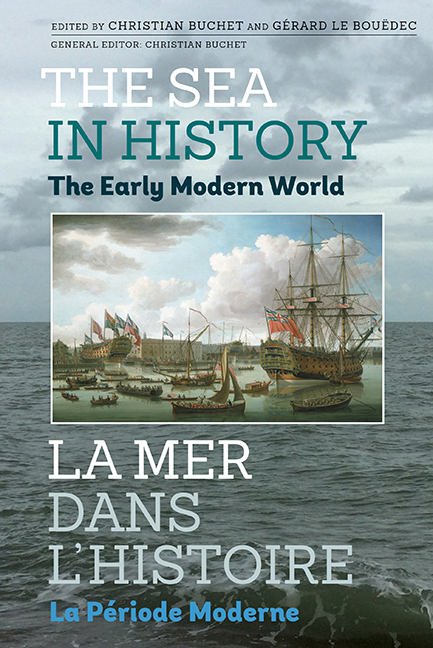Book contents
- Frontmatter
- Contents
- List of Illustrations
- List of Contributors
- Introduction générale et remerciements par
- General introduction and acknowledgements
- Introduction (français)
- Introduction (English)
- LA RÉUSSITE PAR LA MER:La reussite par la mer des territoires et des communautés littorales
- La construction d'un espace mondial: La circulation maritime et les ports
- La forte croissance de l'économie des pêches et des échanges
- Les acteurs de la dynamique maritime
- LA PUISSANCE MARITIME INSTRUMENT DE LA PUISSANCE POLITIQUE ET D'UNE STRATÉGIE GLOBALE DE RAYONNEMENT VOIRE DE DOMINATION: Les puissances maritimes occidentales
- L'ordre des Hospitaliers de Saint-Jean de Jérusalem, Rhodes et Malte, puissance maritime
- Portugal, the west seafront of Europe
- Les formes complexes de la prédominance de l'Espagne, première puissance mondiale de l'histoire
- Le maritime, fondement de la prédominance commerciale et économique des Provinces-Unies
- The keys to British success: trade as a motor and sea as a centre
- Le modèle français: la recherche par l'état de la prédominance maritime, réussites et échecs
- L'Europe Centrale et la mer à l'époque moderne
- Swedish and Danish rivalry to become great powers seen through the development of naval and merchant fleets
- Ambiguous relations between Russia and the sea: causes and consequences
- L'océan Indien, entre convoitises et indifférences
- Les puissances maritimes asiatiques
- L'Afrique
- La politique maritime et l'idéologie
- Mer et développement technologique
- Développement maritime et maîtrise économique et financière
- Développement maritime et maîtrise organisationnelle
- Conclusion (français)
- Conclusion (English)
- Conclusion générale par
- General conclusion by
- Miscellaneous Endmatter
- Miscellaneous Endmatter
Le maritime, fondement de la prédominance commerciale et économique des Provinces-Unies
from LA PUISSANCE MARITIME INSTRUMENT DE LA PUISSANCE POLITIQUE ET D'UNE STRATÉGIE GLOBALE DE RAYONNEMENT VOIRE DE DOMINATION: Les puissances maritimes occidentales
Published online by Cambridge University Press: 11 May 2017
- Frontmatter
- Contents
- List of Illustrations
- List of Contributors
- Introduction générale et remerciements par
- General introduction and acknowledgements
- Introduction (français)
- Introduction (English)
- LA RÉUSSITE PAR LA MER:La reussite par la mer des territoires et des communautés littorales
- La construction d'un espace mondial: La circulation maritime et les ports
- La forte croissance de l'économie des pêches et des échanges
- Les acteurs de la dynamique maritime
- LA PUISSANCE MARITIME INSTRUMENT DE LA PUISSANCE POLITIQUE ET D'UNE STRATÉGIE GLOBALE DE RAYONNEMENT VOIRE DE DOMINATION: Les puissances maritimes occidentales
- L'ordre des Hospitaliers de Saint-Jean de Jérusalem, Rhodes et Malte, puissance maritime
- Portugal, the west seafront of Europe
- Les formes complexes de la prédominance de l'Espagne, première puissance mondiale de l'histoire
- Le maritime, fondement de la prédominance commerciale et économique des Provinces-Unies
- The keys to British success: trade as a motor and sea as a centre
- Le modèle français: la recherche par l'état de la prédominance maritime, réussites et échecs
- L'Europe Centrale et la mer à l'époque moderne
- Swedish and Danish rivalry to become great powers seen through the development of naval and merchant fleets
- Ambiguous relations between Russia and the sea: causes and consequences
- L'océan Indien, entre convoitises et indifférences
- Les puissances maritimes asiatiques
- L'Afrique
- La politique maritime et l'idéologie
- Mer et développement technologique
- Développement maritime et maîtrise économique et financière
- Développement maritime et maîtrise organisationnelle
- Conclusion (français)
- Conclusion (English)
- Conclusion générale par
- General conclusion by
- Miscellaneous Endmatter
- Miscellaneous Endmatter
Summary
RÉSUMÉ. L'origine de l'essor maritime des Provinces-Unies, premièrement celui de la Hollande et de la Zélande, se trouve a l'époque des bourguignons et des Habsbourg, quand ces deux provinces atteignaient déjà une dominance au niveau de la pêche maritime et du transport maritime à l'intérieur des anciens Pays-Bas. Si la pêche maritime fut en déclin à partir de 1650 et si les Provinces-Unies ont dû reconnaître la supériorité navale anglaise au cours du XVIIe siècle, le commerce maritime a gardé son importance. Pendant le XVIIe siècle, l'horizon du commerce international des Provinces-Unies s'est fortement élargi. Si le commerce asiatique du VOC était spectaculaire, le commerce africain et américain étant plus important, le commerce européen a néanmoins été plus important que l'ensemble du commerce asiatique, africain et américain pendant le siècle d'or.
ABSTRACT. The maritime expansion of the United Provinces, first of all that of Holland and Zeland, originated in the Burgundian and Habsburg periods, when these two provinces were already dominating the sea fisheries and the maritime transport sector within the Low Countries. Despite sea fishing declining from 1650 and the United Provinces having to acknowledge the naval superiority of Britain in the 17th century, maritime trade was still strong. During the 17th century, the horizon of international trade of the United Provinces greatly expanded. If the Asian trade of the VOC was spectacular, African and American trade was more important, and Dutch-European trade was yet more important still than trade with Asia, Africa and America combined during the Dutch golden age.
Il est difficile d'imaginer comment les Pays-Bas auraient pu se développer sans littoral. Seule la Drenthe permet de s'en faire une idée. Cette région distincte, entourée par la Frise, Groningue, Overijssel et l'Allemagne, était sans littoral. Elle était et restait rurale avant tout. Au XVIIe siècle, vivaient à la campagne seulement 7,6 personnes par km. Moins de 10 % des habitants vivaient dans des villes. La population de Drenthe représentait 1,3 % de la population néerlandaise de l'époque. La Drenthe n'était pas reconnue en tant que province des Provinces- Unies, mais y était incorporée pour être sous la tutelle des états-Généraux. Rien n'y faisait penser au siècle d'or.
- Type
- Chapter
- Information
- The Sea in History - The Early Modern World , pp. 455 - 465Publisher: Boydell & BrewerPrint publication year: 2017



